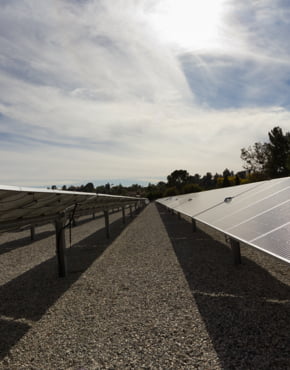Grant to help the region adopt more sustainable landscapes in wake of new law banning use of potable water on non-functional turf
Businesses and institutions gearing up to comply with a new state ban on using potable drinking water to irrigate non-functional lawns will soon get additional help from the Metropolitan Water District to transform turf into more sustainable landscaping, thanks to a state grant awarded to the district.
The California Department of Water Resources presented a $38 million check to Metropolitan officials today as part of its Urban Community Drought Relief program, which has awarded over $217 million to 44 projects to help communities strengthen drought resilience and better prepare for future dry conditions.
“We had a very wet winter, but the time is now to adapt to California’s drier future. It’s the perfect time to transform our yards away from thirsty lawns into drought resilient gardens. Our funding today ensures that communities, regardless of income, can withstand future droughts,” said Karla Nemeth, Department of Water Resources director. “But we can’t just conserve water – California is doubling down on infrastructure to capture, move, store and recycle water to better prepare for extreme swings between floods and drought. The Delta tunnel, expansion of surface reservoirs and groundwater aquifers, and large-scale recycled water projects are all needed to ensure a strong economy and healthy environment in the face of a changing climate.”
This state grant will help Metropolitan increase its turf replacement rebate for businesses and institutions from $2 to $3 a square foot in 2024. The funds will help offset costs to convert up to 30 million square feet of non-functional turf into water-efficient landscaping, building on Metropolitan’s highly successful turf rebate program. In total, the program has directly resulted in the removal of about 218 million square feet of grass, saving enough water to serve about 68,000 households annually.
Last month, Gov. Gavin Newsom signed Assembly Bill 1572, legislation co-sponsored by Metropolitan to phase out the use of potable water to irrigate grass that is not used for recreation or other purposes on commercial, industrial, municipal and institutional properties, beginning in 2027.
“As businesses and institutions comply with this new mandate, we hope they will replace their non-functional turf with sustainable landscapes,” said Metropolitan General Manager Adel Hagekhalil. “This partnership will help them in that transformation.”
“The state’s foresight and support will enable us all to become more resilient as we face climate whiplash and a future of hotter and drier droughts. These are part of a holistic and inclusive water management approach, diverse projects and courageous actions we must take including: resilient and modern conveyance and infrastructure; strategic and reliable storage; new local water supplies, including stormwater capture and recycling; and enhancing and protecting the environment and our communities. These will be part of Metropolitan’s Climate Adaptation Master Plan for Water that will ensure future generations of Southern Californians have the water they need,” Hagekhalil continued.
In addition to bolstering Metropolitan’s turf replacement program, the state funding also will support Metropolitan’s partnership with Southern California Gas Company that provides income-eligible households with no-cost, direct installation of high-efficiency fixtures such as weather-based irrigation controllers and more efficient clothes washers. The funding will allow 5,000 additional households to participate in the direct-install program.
The grant to Metropolitan will also help local public fire departments purchase water-recirculating units that conserve water during essential training exercises — saving over 12 acre-feet of water per unit per year.
“Our generational equivalent of building Hoover Dam is the literal transformation of the very landscape that surrounds us in Southern California, by replacing non-functional turf with native and California Friendly® plants,” said Metropolitan Board Chair Adán Ortega, Jr. “This grant from the state of California helps fuel this widespread landscape transformation, as well as other innovations, that will leave as its monument a common landscape heritage shared by the 19 million people who live here. It’s our legacy for future generations.”
The Metropolitan Water District of Southern California is a state-established cooperative that, along with its 26 cities and retail suppliers, provides water for 19 million people in six counties. The district imports water from the Colorado River and Northern California to supplement local supplies, and helps its members to develop increased water conservation, recycling, storage and other resource-management programs.
DWR is responsible for managing and protecting California’s water resources and works with others to benefit the State’s people and to protect, restore, and enhance the natural and human environments. DWR operates and maintains the State Water Project, oversees dam safety, provides flood protection, helps in emergency response, assists regional and local water agencies, promotes water conservation and safety, and plans integrated watershed management – in all to advance water resource sustainability.
Media Contacts
